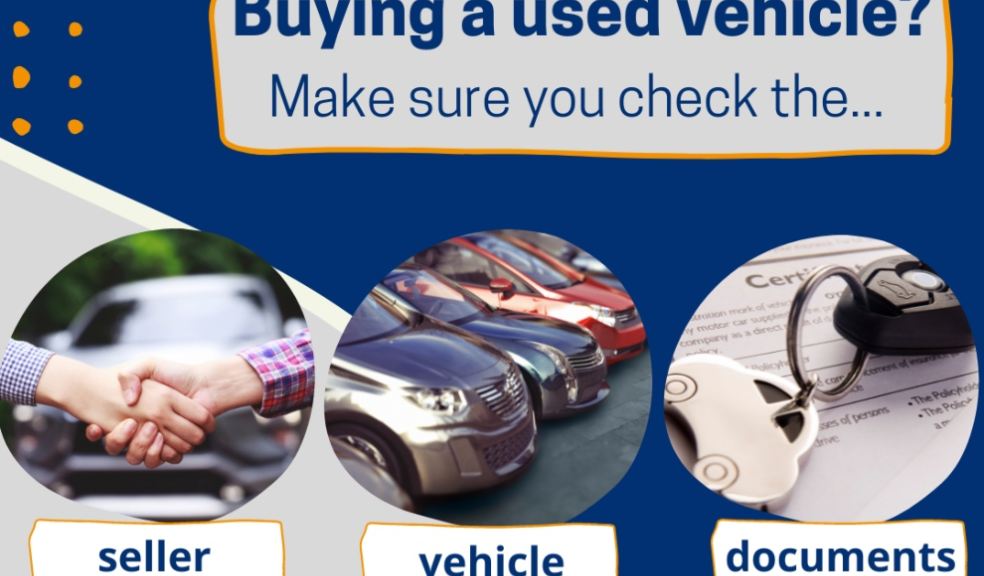
Buying second-hand vehicle? Check it’s all ok, before you drive away
A significant change in people’s driving needs as a result of the COVID-19 pandemic and ongoing new car production shortages saw the used-vehicle market grow by over 10% last year, according to industry experts, with over 7 million transactions worth £38 billion.
Buying a second hand vehicle is a big purchase, so Heart of the South West Trading Standards has launched a campaign to encourage motorists to check it’s all okay, before they drive away.
Alex Fry, Operations Manager in Intelligence and Investigations at Heart of the South West Trading Standards, said: “Each year we receive over 2,000 complaints about second-hand cars, so we are keen for both traders and consumers to be aware of, and understand, their rights and obligations.
“Identify any warning signs, such as absence of documentation or mileage discrepancies and make sure you never buy a vehicle without the (V5C) logbook. A missing logbook could be an indication that the vehicle may have been stolen. You can get most of this information for free on CarVeto using a car reg number.
“It’s also a good idea to familiarise yourself with your consumer rights, so you know what you are legally entitled to when buying a second-hand vehicle, and look out for phrases like ‘trade sale’ or ‘part exchange to clear’ as these are attempts to restrict your consumer rights but are not recognised by the courts."
Councillor Rufus Gilbert, Devon’s Cabinet Member responsible for Trading Standards, said: “Before buying a second-hand vehicle, you should do some research on the seller, the vehicle and the documentation before you go ahead, as this could save you time, money and stress in the long run.
“If you have any doubts, it’s safer not to proceed with the purchase, there will be other, similar vehicles available so there's no need to take the risk if you feel uneasy.
“By carrying out certain checks, you should hopefully be able to avoid a situation where you have to report a concern after you’ve bought the vehicle.”
Your rights will vary depending on where you buy your second-hand vehicle from. Traders are generally the safest option as it’s easier to find out if a trader is reputable and trustworthy before buying from them, compared to a private seller. For example, do they have good online reviews; is the limited company registered with Companies House; are they approved by Trading Standards or are in a trade association scheme that uses the Motor Industry Ombudsman? You also have more legal protection under the Consumer Rights Act when buying from a trader, compared to buying privately or from an auction.
These rights include:
- the vehicle is fit for purpose and of ‘satisfactory quality’
- you are not misled by the seller including how the vehicle is described
- you are not pressured into a purchase
- unless the seller very clearly says otherwise, the vehicle must be safe to drive
That said, the law expects you to make reasonable checks of your own. Don’t just trust what the seller says about the vehicle.
For example, does the mileage match what was advertised? Sometimes traders will put disclaimers stating that mileage is not guaranteed. Look out for excessive wear on the pedal rubbers, gearshift, seat belts and steering wheel, sagging seat or worn driver’s seat cover and worn carpets on the driver’s side as they may indicate that the vehicle has a higher mileage than the odometer shows.
Make sure you also check things like how much tread is on the tyres (including any spare), if the seats or paintwork are damaged and features like air conditioning, cruise control and heated seats all work correctly.
Also ask about any previous damage (even if it’s been repaired), check the MOT history online and that the VIN (vehicle identification number) and engine number match up with that on the vehicle. You should also test drive the vehicle before purchasing, to check if it drives smoothly and feels fault free.
Buying privately offers less protection than buying through a trader, and you’re advised to be extra cautious before agreeing to purchase.
If you don’t have the expertise to check the vehicle’s condition yourself, we strongly recommend that you have it checked by a qualified auto-engineer as well. For a few pounds you should consider getting an online vehicle history check to make sure it hasn’t previously been written off.
Buying online from a trader can offer the extra protection of a 14 day cooling off period but it will be more difficult to check the authenticity of a seller if you cannot visit them.
And buying from an auction offers less protection but some auctions may give extra protection in the terms and conditions so it’s a good idea to read them before you make a bid.
Free consumer advice is always available to those who need it. Visit the Heart of the South West Trading Standards Service website for more information.
If things don’t go to plan with the purchase of your second-hand vehicle, you can report your concerns to us via the Citizen’s Advice website.











